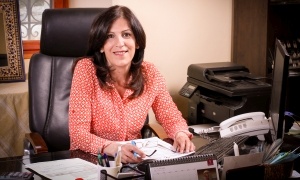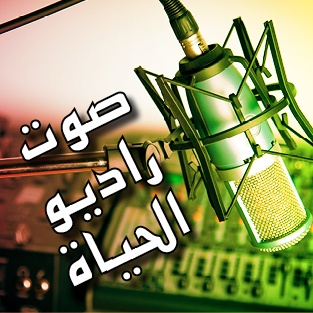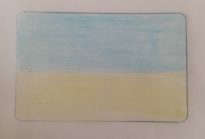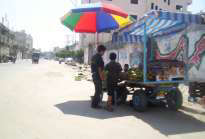
Radio Hayah spoke with Suzan Sahori, the Executive Director, of Bethlehem Fair Trade Artisans.
Small producers in Bethlehem face huge obstacles when trying to make a living from their work, with restricted movement and Chinese imports make a difficult situation worse. However in the midst of the hardship, groups like Bethlehem Fair Trade Artisans, are making a real difference in the community. Operating with fair trade principles, they support marginalised producers of olive wood crafts, embroidery and ceramics. Paul Calvert heard all about their work when he spoke with Suzan Sahori, the Executive Director, of Bethlehem Fair Trade Artisans.
Radio Hayah : What is the Bethlehem Fair Trade Artisans?
Suzan: It's a non-governmental organisation. It was established in 2009, obliged to the fair trade principles. It is established to support the very marginalised producers, men, women and special needs groups, in order to provide them with skilled development, product development and mainly to support them to get into the domestic and international market. They are unable to directly reach these markets themselves, due to many obstacles, so we facilitate connections between them and the international market, through the fair trade principles
Radio Hayah: What projects do you run?
Suzan: We run many different projects, including educational projects. We have also run a project with the EU and our Italian partner and Israeli partner, doing empowerment for the producers. Through this skill development in their language, the English language and the computer language, we have done a few courses in cooperation with the ICP Bethlehem University, to provide them with 40 hours for every course. The English language is to teach them how to use a language when a group visits them, so they are able to express themselves and speak about themselves and their work. The computer language is to teach them how to use the computer, in order to research and Google similar production in the world and to learn about the international world and the other samples that people do in other countries. We have also done technique in embroidery, colour mixing and how to make a product that is sellable. I don't want to make a product to stack on the shelves.
Through our network, we explain to them the international market and the need and we teach them how to follow on these needs and train them wherever it's needed.
Radio Hayah: What sort of producers do you work with?
Suzan: Today we are an umbrella for 53 family olive wood producers. The olive wood history and hand craft is for hundreds of years, generation after generation. The family is the father, mother, son and maybe two cousins working in the same workshop.
We work with four special needs groups in the Bethlehem district. They are working with recycled glass and cards, producing special greeting cards and also working with cards and sand, making greeting cards. They make really beautiful items.
We have a handicraft group that works with felt. It's the most amazing production and of course, the production is all around the Holy Land.
We also work with the Women's Union, which is an umbrella for about 50 women cooperatives and clubs all over Palestine.
Radio Hayah: Is there a lot of artistic talent in Palestine?
Suzan: I have been working with producers for many years now and I have discovered such a talent that only needs to be guided.
Recently we met a group from the city of Beit Sahour, who called on us and asked, "How can you offer our women job opportunities?" When we met with this group and saw some of the work that they are doing, they are really artistic, we have women who do drawings on the glass, women who do furniture from recycled glass, and they are such talented people.
The olive wood producers we work with for the past six years, because we are working with them, we have somehow led the way for them for product development. Now, every year, they are coming with new product and they are now thinking for themselves and inventing a new product and coming back to us and saying, "Do you like this product?" So it is really amazing.
We have artists who do photographs. We have artists who do huge statues in many different ways. There is Palestinian talent.
Radio Hayah: Is fair trade about giving people a living wage?
Suzan: Fair trade is mainly about giving the marginalised a living wage and looking after their well-being. It's also about their environment. Where they are working, are they getting a fair price? Are they being treated well?
It's only recently that people in Palestine would know the fair trade word in Arabic. Women come to us and say, "What is fair trade?"
Fair trade is providing many fair opportunities for many small producers in Palestine.
Radio Hayah: Is it easy for Palestinians to sell their product?
Suzan: Life is not easy in Palestine, so selling the products is an obstacle sometimes because of closures. Let's say the Hebron city is closed; in Jerusalem there is the political unrest, which affects mainly the small producers. That means when I want to send an order on Monday morning and something happens in Jerusalem, then the Post Office cannot come and pick up my products to ship. Over all though, exporting of our goods has been going really smoothly.
The shipping cost is most expensive in Palestine, because as Palestinians we cannot ship directly to our customer, we have to go through the channels of Israel. That means that our local agent is only an agent to work between us and the Israeli agent.
To ship a container to Germany, means that our local person will have to consult with the Ashdod, or Haifa port and the goods have to be transferred from a Palestinian truck, from, for example, Bethlehem, to the checkpoint in Hebron. Then on the other side, an Israeli truck will come and they will unload our truck, as our truck cannot go directly from here to Haifa, or Ashdod. The Israeli truck
then takes our product inside Israel. Even to ship a small package to the US, it also has to go through the Israeli Post Office, so we coordinate with the Israeli Post Office to send the car and pick up those packages.
Radio Hayah: Is fair trade bringing dignity to Palestinians?
Suzan: Fair trade is all about dignity. After doing the audit report by the World Fair Trade Organisation, we realised how they are happy and want to empower Bethlehem fair trade. They say, "If you are empowered that means you are bringing more orders and I know my money is safe. I know I am learning something in you and I am benefiting and you are creating sustainability with dignity."
Radio Hayah: Does Palestine find it difficult competing with someone like China?
Suzan: Yes, of course. Unfortunately the Chinese market is entering into Palestine and with a huge impact. To give you an example, our women make an income by putting the rosary together from the olive wood bead. Many rosaries are made in China and brought into Palestine and sold in the souvenir shops. The Chinese market is affecting the small producers very much. There is no way we can compete with the cost. Just recently at a fair, a Chinese young couple came and I thought they were just looking at our products and wanted to buy something, but he told me, "I can make you this product with better quality and much cheaper. Can I take a photo of this product?" I said, "I'm sorry, but this product is made by handicapped clients and it should not be perfect and I don't want it perfect. It is to give those special needs groups a way to sell these products."
They are trying to copy and they are making nativities now, but I hope that the world will keep realising what is real Holy Land made products and what is Chinese products.
Radio Hayah : Without fair trade, would producers be exploited by bigger organisations?
Suzan: Yes, very definitely the small producers are exploited by the larger organisations and by the middle man, souvenir shops.
Unfortunately the small producers don't have olive wood raw materials on hand. That means they have to go and buy the wood, but don't have the cash to pay for it, so they buy from a larger workshop and pay treble, or four times the price. So their small products will cost much more than larger producers.
Through fair trade we are trying to provide the small producers with raw materials at the beginning of the year. This year we were successful to give them each a small grant to buy wood from the beginning of the year. It's not a large amount, it's a beginning, but I want them to buy the wood and be able to have raw materials on hand. They will pay it back very easily from their orders.
We really need to work more on this issue. Unfortunately we don't have copyright. There is a lack of capacity in our governmental organisations, to really fulfil these needs for those small producers.
Radio Hayah: Do you get a chance to travel and talk about Bethlehem fair trade?
Suzan: Yes I do get the chance and I grab every chance I get to talk about fair trade and also about the political situation in Palestine, as they are related with each other.
Our old project was called Fair Trade Fair Peace. When you talk about fair trade, when you are providing a small producer a good income with good dignity that means he is able to think about other things in life and not just worry about tomorrow. It's providing for him economical sustainability with the work that fair trade is giving them.
Radio Hayah: You also have online shopping don't you?
Suzan: We have an online shop and get many hits. Our products are liked by so many. We get small orders for things like a nativity that is made by the Together Life Centre in Bethlehem. The shipping costs more than the felt nativity itself, but they are willing to pay for it. Our online shop has proven to be successful.
Radio Hayah: Are you making a difference in the community?
Suzan: I'd like to believe we are making a difference in the community. We are established to provide economical social sustainability and we are making a difference in many producers' lives. We are also working much harder to provide for the others who could not sell a lot of their products. We are trying to work for the next three years to do new product development, to make more sales for all our beneficiaries, not just for 20-30 producers.
I would like to say that the difference we are making is shown in the conferences that we do with the producers. Through the attendants and the dedication of the producers to fulfil the orders on time. They are really part of this organisation and because we pay them on time and sometimes ahead of time, if someone needs a loan for an emergency in his home, he comes to us and we give him money, because we have a trust between each other. Fair trade is all about humanity and trust.
Radio Hayah: What is your prayer for the producers of Palestine?
Suzan: I do pray that the political situation will change and that stability in their lives and the future of their children will be realised. For now we know the grief they share with us and we know the hardship they are living in, so I do pray first of all that peace will be upon this city. That they can move freely and can go to Israel and travel all over the world to sell their products directly and reach a level where they can be their own bosses and be in control of the beautiful products they make.
Radio Hayah : What is your website for people who'd like to know more or perhaps would like to buy product?
Suzan: Our website is www.bethlehemfairtrade.org.
 صوت راديو الحياة
صوت راديو الحياة
 العيش في زمن الحرب مقابلة راديو حياة مع منظمة شباب مع مهمة من كييف YWAM – الجزء الثاني
العيش في زمن الحرب مقابلة راديو حياة مع منظمة شباب مع مهمة من كييف YWAM – الجزء الثاني
 الكنيسة في غزة – الجزء الثاني
الكنيسة في غزة – الجزء الثاني